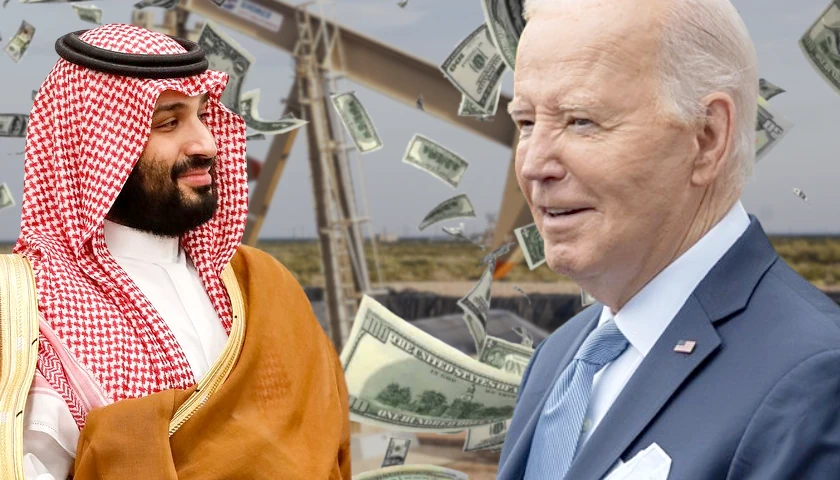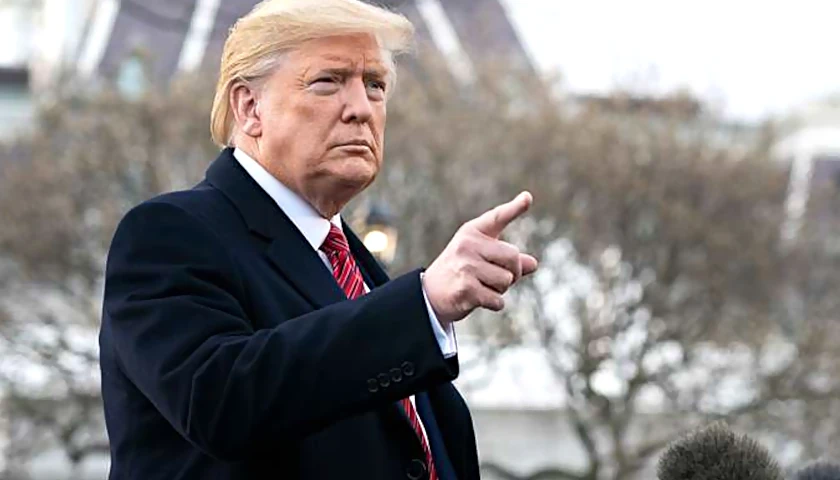by Debra Heine
On Sunday, with no official statement from either side, Saudi Arabia apparently allowed a deal with the U.S. to expire that could have dire financial ramifications.
The Kingdom reportedly did not renew its 50-year petro-dollar agreement with the United States when it expired on June 9, meaning Saudi Arabia can now sell its oil in other currencies, including the Chinese renminbi (RMB), Euros, Yen, and Yuan, instead of exclusively in U.S. dollars. According to reports, the use of digital currencies like Bitcoin is also being considered.
The petro-dollar agreement was signed on June 8, 1974, and set up two joint commissions, “one based on economic cooperation and the other on Saudi Arabia’s military needs,” the Business Standard reported. In exchange for the United State’s help with its security, military and infrastructure, Saudi Arabia agreed to only sell its oil in American dollars, so all other countries who wanted to buy its oil had to use U.S. dollars.
Last month, White House National Security Adviser Jake Sullivan met with Saudi Crown Prince Mohammed bin Salman in the Saudi city of Dhahran to review an “almost finalized” draft of a new deal between Washington and Riyadh, Reuters reported.
The two discussed “the semi-final version of the draft strategic agreements between the two countries, which are almost being finalized,” according to a statement.
The deal reportedly included “U.S. security guarantees and civilian nuclear assistance.”
Bin Salman and Sullivan also discussed the need to find a “credible track for bringing about the two-state solution” for Israel and the Palestinians, stop the Israel-Hamas war and facilitate the entry of humanitarian aid, the statement said.
Earlier, Sullivan met with bin Salman in Riyadh, where, according a White House statement in December, they “discussed a number of bilateral and regional matters, including ongoing efforts to create new conditions for an enduring and sustainable peace between Israelis and Palestinians.”
The Israel and Palestinian conflict was also high on the agenda when Secretary of State Antony J. Blinken met with bin Salman in Jeddah on March 21.
“The Secretary underscored the importance of urgently addressing humanitarian needs in Gaza,” a State Department readout of the meeting said.
Secretary Blinken reaffirmed the United States’ commitment to achieve an enduring end to the crisis in Gaza and to the establishment of a future Palestinian state with security guarantees for Israel. The Secretary and the Crown Prince continued discussions on achieving lasting regional peace and security, including through greater integration among countries in the region and enhanced bilateral cooperation between the United States and Saudi Arabia. The Secretary and Crown Prince also discussed the need for an end to Houthi attacks that are undermining both freedom of navigation in the Red Sea and progress on the Yemen peace process.
Neither the Biden regime nor the Kingdom have put out a statement regarding the apparent expiration of the petro-dollar deal, a momentous development that could arguably lead to the end of the United State’s status as a superpower.
Any shuttling of the deal, a cornerstone of U.S. global economic dominance for decades, would cause major financial upheavals in the West and hasten the global shift away from the U.S. dollar, and possibly lead to the collapse of the dollar.
National security expert David Reaboi told American Greatness that it’s not surprising that the two regimes are keeping this on the down-low because Saudi Arabia could be using the agreement as a bargaining chip in its talks with the Biden regime. “Is it necessarily cause for Americans to be worried, or is it just brinksmanship and negotiations?” he asked.
“I think it’s important to see the expiration of the 1974 petrodollar agreement in the context of ongoing negotiations and the history of tension between the Saudis and the Biden administration when it comes to the Kingdom’s greatest threat, Iran,” Reaboi said, going on to explain that the Saudis are just “expressing displeasure” with the Biden regime’s alarming foreign policy agenda in the Middle East.
More than any other issue, our Gulf allies have been alarmed at the Biden White House’s embrace of Iran and the protection of the Islamic Republic’s terrorist proxies in Gaza, Iraq, Lebanon and Yemen. While Blinken and Sullivan now promise the Saudis American protection from Iran in the form of a defense pact, Riyadh can see that these security guarantees don’t necessarily amount to much: if this administration prevents Israel–with whom the US has had such a close, special relationship–from defeating the Iranian proxies that have attacked it, why would anyone in Riyadh believe Biden would have their back against Iran or its proxies? The Saudis would be making a deal that would put them in Israel’s unenviable position: vague public expressions of support in exchange for basically surrendering their sovereignty. At the end of the day, neither Israel nor Saudi Arabia would be wise to put its survival in the hands of Biden administration officials who are looking, above all, to cut deals with their enemy in Tehran.
Reaboi said the Biden administration is trying to negotiate a bilateral agreement that will bring the Saudis into the Israel/Palestinian conflict, “hoping the Kingdom would be a pressure point to entice Israel to accept a new, well-funded and diplomatically viable Palestinian terror state within its borders.”
Such a US-Saudi deal is designed primarily to destroy the Abraham Accords, which succeeded because it removed the Palestinians’ veto from Israel’s potential relationships with America’s moderate, anti-Islamist Arab allies.
The Saudis and the Abraham Accords signers have largely been on the sidelines during the conflict in Gaza; they understand that an Israel that is victorious against Hamas (and, soon, Hezbollah in the north) is, for them, far more advantageous than an Iranian proxy Palestinian state. Getting roped into Biden and Blinken’s mess with regards to Israel and Hamas is a no-win situation for the Kingdom.
Reaboi said the expiration of the petrodollar agreement is likely “leverage the Saudis can bring to the table in these negotiations,” and expressed doubt that they will actually “pull the trigger and destroy the petrodollar, because once they’ve done it, they can’t turn back the clock.”
Additionally, such a move would “complicate matters with future Republican presidents” as the 2023 elections rapidly approach, he said.
“Riyadh likely understands that, with a new Trump administration, they would almost certainly get a different, more circumspect American posture toward Iran—as well as a bilateral agreement far more beneficial to the Kingdom,” Reaboi concluded.
– – –
Debra Heine reports for American Greatness.
Photo “President Joe Biden” by President Joe Biden. Photo “Mohammed Bin Salman” by Palácio do Planalto. CC BY 2.0.




